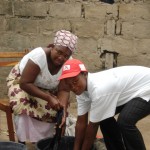No longer invisible: caregivers speak out
Posted on September 4, 2009.
Guest blogger: Glenda Muzenda, Care Work Manager at Gender and Media Southern Africa (GEMSA)
I just attended the Grassroots Women’s International Academy on Home Based Care in Johannesburg, South Africa.
It was a mixed bag of fun meeting women from all walks and works of life from Kenya, Cameroon, Uganda, Malawi, Nigeria, Ethiopia, Rwanda, Zambia, Ghana, Namibia, Zimbabwe, and South Africa.

Caregiving in Mozambique. Photo: Janine Morna
The Huairou Commission and the Land Access Movement of South Africa brought us together to share experiences of home-based care.
It is fascinating how in Malawi the care givers alliance has moved forward. Victoria Kalomba, of the Malawi Group of Women Living with HIV and AIDS told us that the ministry of health and social development had spearheaded a campaign to raise awareness about people infected and affected by HIV.
The process had the ministry informing the support groups of individuals who had tested positive after visiting clinics so they could be reached and helped.
I am worried about this way of outing positive people even in the aim of mobilizing support groups. I feel that it is a human right violation to have to give information of someone’s HIV status.
Victoria was less worried. She said that the government has passed a policy that makes any name calling of people living with HIV a criminal offence. Okay.
Yet there is always stigma, just like one hears sexist and racist comments daily. Just because it is punishable has not stopped people from abusing or victimizing others. So I am wary of this and rather uncomfortable.
Next move
For caregivers, the issues are:
· remuneration,
· training and recognition of care givers as professionals,
· logistic and material support,
· psycho-social support to care givers and
· gender equality, and encouraging men to participate in care giving
Our next move is to lobby governments to recognize care work as a profession.

Carers ease the burden of disease. Photo: M. Sayagues
My sense is that there is a need for an alliance to assist in forming one body to represent caregivers. Most women caregivers said they felt disrespected, as they are not recognised for all their care work in health. No thanks are coming their way. They are very sore and disheartened at this lack of recognition. To move forwards, they require a voice to represent them.
One caregiver from Ethiopia said: “I will be taking so much home! I have realised that there are other countries struggling with lack of government support in the area of care work. We hope to continue to be in touch, especially on the issue of the alliance”.
To be able to laugh, as we share these issues, gives one hope. It is a strategy that I feel will take these unsung heroes to greater heights and at some point their voices will be heard.
As we said farewell, I felt a strong bond of sharing experiences and a need to continue the network.
I am sure I will meet most of these passionate women at this week’s SADC Heads of State Summit in Kinshasa, Democratic Republic of Congo, where today GEMSA is launching its report “Making Care Work Count - A Policy Analysis.”
The study covers Botswana, Democratic Republic of Congo, Lesotho, Malawi, Mauritius, Mozambique, Namibia, South Africa, Swaziland, Tanzania, Zambia and Zimbabwe.
GEMSA will strategize with civil society partners to lobby around care work in these countries.

